

THE COINAGE OF THE TWELEVE CAESARS
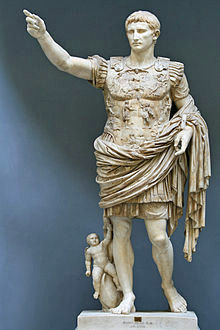 AUGUSTUS
CAESAR 27 BC-14 AD
AUGUSTUS
CAESAR 27 BC-14 AD
Following his defeat of Marcus Antonius at the Battle of Actium in 31 BC, Octavian, the nephew and adopted son of Julius Caesar found himself without rivals for complete power. Octavian decided that it would be safer in the long run to disguise his power behind the trappings of restoration of the Republic. In so doing he presented himself as a "first citizen among equals" and was awarded the title Augustus by the Senate after he publicly returned all power to the Senate.
The reign of Augustus is remembered as one of moderation and wise rule. Augustus took steps to repair the damage done during the decades of civil war, he undertook building projects and enacted policies that were mindful of the welfare of the lower classes. Among the difficulties he faced was that of succession, he outlived numerous successors including Marcus Agrippa, Caius and Lucius Caesar and Nero Claudius Drusus. He also saw the loss of three legions under the command of Varus in Germania, this loss deeply troubled the aging emperor. In spite of his wisdom as a ruler, Augustus sometimes exhibited a cruel nature, in one example he plucked out a critic's eyes with his bare hands. More often than not when he received a plea for mercy he would Laconically reply "you must die." In spite of exercising unlimited power, Augustus seems to have remained modest and unassuming. He took little interest in his appearance or wardrobe and lived in humble apartments rather than a grand palace.
The reign of Augustus also saw the birth of Jesus in Judaea in about 6 BC. The Ministry of Jesus in the following reign would have a profound effect on the lives of millions of people down through the ages and would in the words of His Apostles "turn the world upside down."
Augustus died at the age of 75 in AD 14. He boasted that he "found Rome a city of brick but left it one of marble." He was heard to hope out loud on his deathbed that he had "acted his part on the stage of life well." He was succeeded on the throne by his stepson Tiberius Caesar.
 |
ROMAN EMPIRE AUGUSTUS CAESAR SILVER DENARIUS |
 |
|
2 BC - AD 4 |
19mm 3.8g | RIC I 208 |
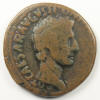 |
ROMAN EMPIRE AUGUSTUS CAESAR BRONZE AS |
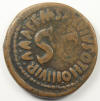 |
|
7 BC |
19mm 3.8g | RIC I 431 |
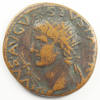 |
ROMAN EMPIRE AUGUSTUS CAESAR (Under Tiberius) BRONZE AS |
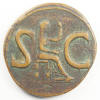 |
|
AD 15-16 |
28mm 10.5g | RIC I 72 |
 |
ROMAN EMPIRE AUGUSTUS CAESAR (Under Caligula) BRONZE DUPONDIUS |
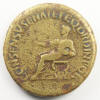 |
|
AD 37-41 |
29mm 15.8g | RIC I 56 |
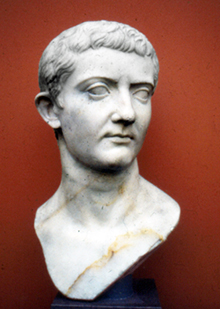 TIBERIUS
CAESAR AD 14-37
TIBERIUS
CAESAR AD 14-37
Tiberius Caesar was born in Rome in 42 BC. He was the son of Tiberius Claudius Nero and Livia. His mother divorced her husband and married Octavian (the future Augustus) in about 39 BC. When Augustus became emperor he invested Tiberius with military command and Tiberius proved himself to be an able commander. In 11 BC Augustus forced Tiberius to divorce his wife Vipsania (who he apparently very much loved) and to marry his daughter Julia (who Tiberius loathed). Tiberius had a rather gloomy nature and this act sent him into a deep depression. After a few years Tiberius decided to retire from public life and moved to Rhodes where he lived in seclusion.
Tiberius was recalled to Rome to become the heir of Augustus, who eventually died in AD 14. The Senate granted Tiberius the same titles Augustus had held and like Augustus before him, Tiberius pretended to be reluctant to accept power. However, Tiberius showed his true feelings when he commented that the men of the Senate were "only fit to be slaves." Tiberius' popular successor Germanicus Caesar died suddenly in AD 19 and the public widely suspected the the emperor was responsible.
The Ministry of Jesus took place in Judaea during the reign of Tiberius from about AD 27-30. Pontius Pilate, the Prefect of Judaea oversaw the crucifixion of Jesus during Passover in AD 30 because of Jesus' unpopularity with the Jewish leadership and out of fear of a rebellion. Three days after His execution, Jesus' followers reported that they had found his tomb empty, they went on to found Christianity.
The death of Tiberius' son and heir Drusus in AD 23 sent him into another deep depression. This allowed the Praetorian Prefect Sejanus to assume the position of the emperor's most trusted advisor. Sejanus began a series of show trials and had many leading citizens executed on false charges. Sejanus went a step too far in apparently attempting to overthrow the emperor himself and was executed in AD 31. In AD 26 Tiberius again went into self imposed exile on the island of Capri. Rumors of cruelty, debauchery and perversion taking place on the island circulated widely. Tiberius summoned Caius Caesar, the only surviving child of Germanicus to Capri and made him his heir. There are stories of Caius killing Tiberius to gain the throne, but the emperor was 77 at the time of his death in AD 37 so it does not seem unlikely that his death was due to natural causes.
 |
ROMAN EMPIRE TIBERIUS CAESAR SILVER DENARIUS |
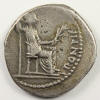 |
|
AD 16-37 |
20mm 3.7g | RIC I 26 |
 |
ROMAN EMPIRE TIBERIUS CAESAR BRONZE AS |
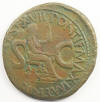 |
|
AD 15-16 |
29mm 10.3g | RIC I 33 |
CLICK HERE TO RETURN TO THE VIRTUAL MUSEUM LOBBY